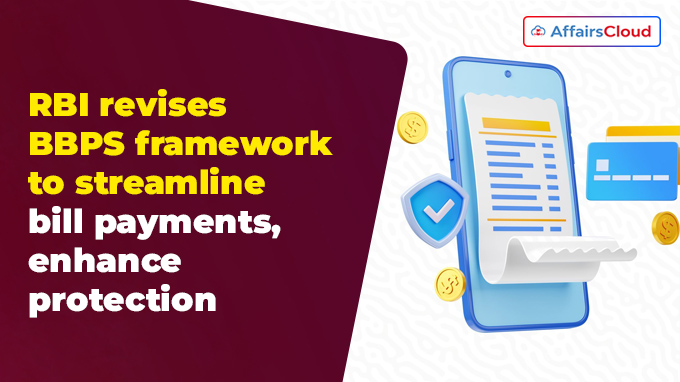
On February 29, 2024, Reserve Bank of India (RBI) has revised the regulatory framework for Bharat Bill Payment Systems (BBPS) based on a review of developments in the payments landscape. The revised directions, called as RBI (BBPS) Directions, 2024, will be applicable from 1st April 2024.
- This will streamline the process of bill payments, enable greater participation, and enhance customer protection among other changes.
The master direction of RBI (BBPS) directions 2024 was issued under Section 18 read with Section 10(2) of the Payment and Settlement Systems (PSS) Act, 2007 (Act 51 of 2007).
About BBPS:
BBPS is an integrated bill payment platform enabling payment or collection of bills through multiple channels- mobile apps, mobile banking, physical agents, and bank branches using various payment modes, like Unified Payments Interface (UPI), internet banking, cards, cash, and prepaid payment instruments.
Applicability:
i.The provisions of these Directions will be applicable to NPCI Bharat Bill Pay Limited (NBBL), a wholly owned subsidiary of National Payments Corporation of India(NPCI); and all Bharat Bill Payment Operating Units (BBPOUs).
ii.NBBL is designated as the Payment System Provider for BBPS.
iii.Any entity, other tan the biller, facilitating bill payments outside BBPS, falls under the definition of a ‘payment system’ per Section 2(1)(i) of the PSS Act 2007, necessitating authorization.
Participants in BBPS:
i.Bharat Bill Pay Central Unit (BBPCU): NBBL as the BBPCU connects customers and billers through Customer Operating Unit (COU) and Biller Operating Unit (BOU), handling clearing and settlement activities.
ii.BBPOUs: Banks, non-bank Payment Aggregators (PAs), and authorized entities can participate without separate authorization but must inform RBI before commencing operations.
Roles and Responsibilities:
i.BBPCU: It governs participation criteria, system operations, and technical standards. It guarantees settlement for all transactions routed through NBBL, requires BBPS reference numbers from payment initiation stage, prohibits fund flow through any Technology Service Providers (TSP), and establishes a consumer dispute resolution framework.
ii.BoU: Onboarding billers to BBPS;Ensuring compliance to due diligence requirements in respect of onboarding of merchants, Ensuring compliance with additional due diligence for specific biller categories and conducting due diligence of billers onboarded via biller aggregators.
iii.COU: Facilitating customer access to billers via digital/physical interfaces, ensuring dispute resolution systems, and assuming responsibility for agent institutions’ activities per agreements with the COU.
Key Points:
i.A non-bank BBPOU requires to open an escrow account with a Scheduled Commercial Bank exclusively for BBPS transactions.
ii.Non-bank BBPOU operates as Payment Aggregator (PA) when it collects funds from its customers or settles funds with the billers onboarded by it. For the purpose of maintenance of escrow account, payment system operated by BBPOU will be the designated payment system’under Section 23A of the PSS Act, 2007.
- An escrow account is an account where funds are held in trust by two or more parties to complete a transaction which is still ongoing. An escrow agent is a mediator who holds this escrow account.
ii.NBBL is required to formulate a dispute resolution framework for centralized end-to-end complaint management in compliance with RBI’s guidelines.
- All COUs and BOUs must link to the central system for customer and biller dispute resolution following NBBL’s framework.
Note:
With the above directions, the following guidelines in connection with BBPS have been superseded:
- Implementation of Bharat Bill Payment System – Guidelines (Updated as on May 26, 2022)
- Bharat Bill Payment System – Expansion of biller categories
- Bharat Bill Payment System – Addition of Biller Category
- Bharat Bill Payment System – Amendment to guidelines
RBI issues Master Direction for Filing of Supervisory Returns
The RBI (Filing of Supervisory Returns) Directions 2024 were issued to reduce the compliance burden of banks and non-banks on issues related to filing supervisory returns and risk mitigation.
- These directions are single reference for all Supervisory Returns.
These are issued by RBI in excercise of its powers conferred under sub section (2) of section 27 and section 35A of the Banking Regulation (BR) Act, 1949 as amended from time to time; Section 56 of the BR Act, 1949 and extant provisions of The Banking Regulations (Co-operative Societies) Rules, 1966; extant provisions of Chapters IIIA and IIIB of the RBI Act, 1934; and pursuant to section 12 A of the Securitization and Reconstruction of Financial Assets and Enforcement of Security Interest Act, 2002.
Applicability:
These will be applicable to the following Supervised Entities (SEs)
i.All Commercial Banks excluding Regional Rural Banks (RRBs).
- Commercial Banks include Public Sector Banks (PSBs), Private Sector Banks (PVBs), Small Finance Banks (SFBs), Payment Banks (PBs), Local Area Banks (LABs) and Foreign Banks (FBs).
ii.All Primary (Urban) Co-operative Banks.
iii.Select All India Financial Institutions
iv.All Non-Banking Financial Companies [excluding Housing Finance Companies (HFCs)] and all Asset Reconstruction Companies (ARCs).
What are Supervisory Returns?
It refer to all periodic / ad-hoc data submitted to RBI in formats prescribed from time to time, irrespective of the technology platform, periodicity and the mode of submission.
Key Highlights:
i.SEs should ensure that resources and IT infrastructure is adequate to meet a broad range of on-demand, ad hoc reporting requests, including requests during stress / crises situation and to meet supervisory queries
ii.Commercial banks have to file 36 returns, select all India financial institutions have to file 10 returns; urban co-operative banks (20 returns) and NBFCs (12).
iii.SEs have to submit the applicable returns with accurate and complete data, strictly within the prescribed timelines. Click here for timelines
iv.The RBI may introduce new returns/withdraw existing returns (both ad-hoc/ regular) for submission by SEs.
v.SEs have to submit all the returns through online mode as per the prescribe formats and manner.
vi.SEs must provide accurate information in their returns within specified deadlines.
viii.SEs who fails to comply may result in penalties or fines imposed by RBI under the Banking Regulation Act, 1949, the RBI Act, 1934, or the Securitization and Reconstruction of Financial Assets and Enforcement of Security Interest Act (SARFAESI), 2002.
ix.For the list of notifications / circulars that are repealed (whole or in part) with the issuance of these new directions, Click Here.
All-India House Price Index Rises to 3.8% in Q3FY24
As per the RBI’s Quarterly House Price Index (HPI) for Q3FY24, all-India HPI increased by 3.8% (Year-on-Year/Y-o-Y) in Q3FY24 compared to 3.5% growth in Q2FY24 and 2.8% in Q3FY23.
- Annual HPI growth is highest in Chennai, Tamil Nadu (TN) at 8.4% and lowest in Kochi, Kerala at 0.6%.
- On a sequential basis, all-India HPI increased by 1.6% in Q3FY24.
- Among the ten cities, six (viz., Delhi, Mumbai, Chennai, Bengaluru, Ahmedabad and Kochi) recorded a rise in house prices during Q3FY24.
Recent Related News:
i.On October 23, 2023, the Reserve Bank of India (RBI) in consultation with the Government of India (GoI), has expanded the range of products offered through RBI Retail Direct portal by allowing retail investors to subscribe to Floating Rate Savings Bonds , 2020 (Taxable)- FRSB 2020 (T).
ii.RBI has granted in-principle authorization to MobiKwik’s payment gateway
arm Zaakpay to operate as an online payment aggregator (PA).
About Reserve Bank of India (RBI):
Governor – Shaktikanta Das
Deputy Governors – Swaminathan Janakiraman, Michael Debabrata Patra, M. Rajeshwar Rao, T. Rabi Sankar
Establishment– 1st April 1935
Headquarters– Mumbai, Maharashtra




